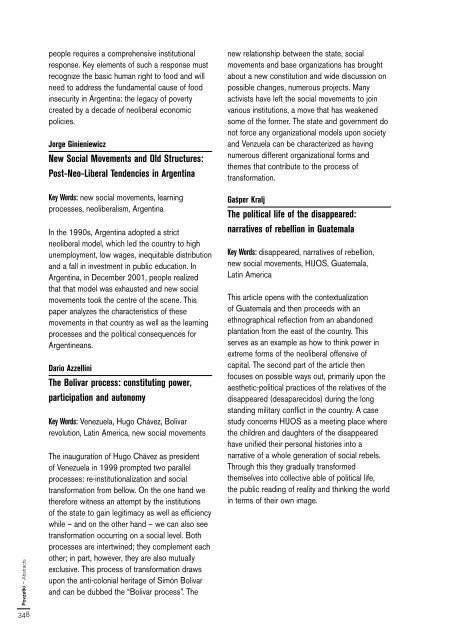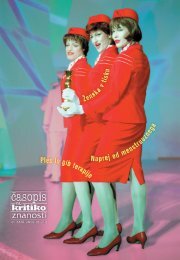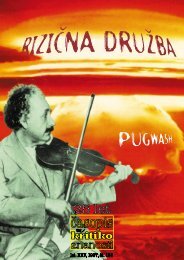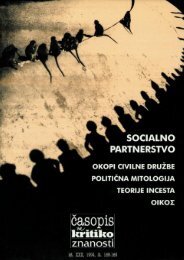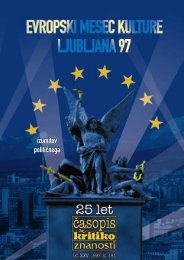- Page 2 and 3:
Izdajanje »asopis za za kritiko zn
- Page 5 and 6:
Darij Zadnikar Preæivetje uma v ne
- Page 7 and 8:
enoten evropski πtudijski prostor,
- Page 9 and 10:
z naravoslovjem in tehniko: kdor de
- Page 11 and 12:
“obrobnosti”. Brazilsko gibanje
- Page 15 and 16:
ZapatistiËna vojska nacionalne osv
- Page 17 and 18:
kot so potem rekli, nismo bili sami
- Page 19 and 20:
svoji strani (Ëemur bi se reklo un
- Page 21 and 22:
Ne samo, da so zrasle zapatistiËne
- Page 23 and 24:
Se pravi, na træiπËu vidimo prod
- Page 25 and 26:
pusti v bedi mnogo MehiËanov, tako
- Page 27 and 28:
Ali pravimo, da politika ne sluæi
- Page 29 and 30:
svoji dræavi in se solidarizirajo
- Page 31 and 32:
1. ©e bolj se bomo povezovali s po
- Page 33 and 34:
z nekorumpirano opozicijo, ki ne bi
- Page 35 and 36:
Hernán Ouviña Latinska Amerika: U
- Page 37 and 38:
Zaradi vsega tega moramo najprej po
- Page 39 and 40:
Po drugi strani moramo, ko se lotim
- Page 41 and 42:
naslavljajo vladajoËih. Skrajen pr
- Page 43 and 44:
ni socialni forum in KmeËko pot na
- Page 45 and 46:
»e nadaljujemo z drugo toËko, pra
- Page 47 and 48:
ga gibanja kmetov brez zemlje in pr
- Page 49 and 50:
materialnega okolja, ki bi bilo neo
- Page 51 and 52:
moremo imeti za “podeæelsko frak
- Page 53 and 54:
sporazum o javnem sektorju, razblin
- Page 55 and 56:
Dina Khorasanee Upor kot ustvarjanj
- Page 57 and 58:
2. METODOLOGIJA: ‘AKADEMSKI AKTIV
- Page 59 and 60:
kot 5 milijonov pa v skrajni revπ
- Page 61 and 62:
ve produkcije, gospodarstva, pa tud
- Page 63 and 64:
jih nikoli ne da zreducirati na eno
- Page 65 and 66:
lahko poimenovali ‘depolitizacija
- Page 67 and 68:
MTD Solano skuπa mnoæiti prostore
- Page 69 and 70:
jeni s strukturami nacionalne dræa
- Page 71 and 72:
odo, avtonomijo in integriteto kot
- Page 73 and 74:
Za pojem proti-oblasti, kakrπnega
- Page 75 and 76:
anj, ki delijo πiroke cilje direkt
- Page 77 and 78:
ljenje’ in ‘ne vedenje’. V en
- Page 79 and 80:
no identificirajo po ‘skupni’ g
- Page 81 and 82:
ili na dilemo, so po letu dni disku
- Page 83 and 84:
oblasti. NamreË, Ëe je kolektiv s
- Page 85 and 86:
Tu se pomembnost ‘jaza’ nazorno
- Page 87 and 88:
terjem: druæbenim upornikom. »e r
- Page 89 and 90:
DINERSTEIN, ANA (2003): “Power or
- Page 91 and 92:
Chávezov projekt, ki odseva tudi v
- Page 93 and 94:
nem pogovoru. Prav tako je vladi in
- Page 95 and 96:
pez Maya, 2003: 219) ©tevilni dru
- Page 97 and 98:
Chávezovi volivci in volivke priha
- Page 99 and 100:
scenirali. (Azzellini, 2002) Na mil
- Page 101 and 102:
macijsko gibanje brez Cháveza ne b
- Page 103 and 104:
tov, ki bo blizu vladi. Ta obËutek
- Page 105 and 106:
πene alternative πe ne obstajajo.
- Page 107 and 108:
Gaπper Kralj PolitiËno æivljenje
- Page 109 and 110:
med letoma 1981 in 1983 prisilno re
- Page 111 and 112:
avtomobilov, dæipov in avtobusov.
- Page 113 and 114:
Evrope (55 milijonov mrtvih le v dr
- Page 115 and 116:
mu razmerju, izginotje implicira fa
- Page 117 and 118:
priËajo o neËem bolj dramatiËnem
- Page 119 and 120:
so Madres de la Plaza de Mayo socia
- Page 121 and 122:
viËno afirmacijo njihovih svojcev,
- Page 123 and 124:
Victoria Sanford Kolumbijske mirovn
- Page 125 and 126:
vi, ki potekajo skozi fantomsko dr
- Page 127 and 128:
Sporazumi med Cacarico in kolumbijs
- Page 129 and 130:
imajo mirovne skupnosti zdaj vlogo
- Page 131 and 132:
jaπke enote imeli veË moænosti,
- Page 133 and 134:
æene akterje (ki fluidno vstopajo
- Page 135 and 136:
zemlje, z manipuliranjem s cenami k
- Page 137 and 138:
ki je bogato tako z revolucionarnim
- Page 139 and 140:
æe prav to poletje 2005 z æe omen
- Page 141 and 142:
ubogljivega izvrπevanja ‡ so pro
- Page 143 and 144:
ano Zapata snail mu’ktatzobonbail
- Page 145 and 146:
opisujejo v pogovorih ali v zapisih
- Page 147 and 148:
ucha) do 15 (La Morelia) ali veË p
- Page 149 and 150:
nem. Naπo prihodnost gradimo avton
- Page 151 and 152:
V boju proti neoliberalizmu zapatis
- Page 153 and 154:
prav za seminarje “Alternative v
- Page 155 and 156:
uËilnicami in prostori za bivanje,
- Page 157 and 158:
presij telesa iz otrok, iz nekaj ac
- Page 159 and 160:
Ana Paula Gutiérrez La Lucha Sigue
- Page 161 and 162:
iπka druæbena gibanja pomenijo pr
- Page 163 and 164:
æaj in upanje na druæbeno integra
- Page 165 and 166:
odobrila amandma za Ëetrti Ëlen U
- Page 167 and 168:
selcev vkljuËuje spoπtovanje samo
- Page 169 and 170:
6. ÆENSKE IN ZAPATIZEM: UDELEÆBA
- Page 171 and 172:
liko je takih, ki æe imajo otroke,
- Page 173 and 174:
V obeh sistemih so æenske podrejen
- Page 175 and 176:
PrviË: Æenske imajo, ne glede na
- Page 177 and 178:
kako so staroselke postavljene v to
- Page 179 and 180:
HERNÁNDEZ, A. (2002): “National
- Page 181 and 182:
Luis Hernández Navarro Zapatizem i
- Page 183 and 184:
Temu laboratoriju novih druæbenih
- Page 185 and 186:
V sinhroniji πirokega obËinskega
- Page 187 and 188:
kot tudi z zdruæitvijo kljuËnih o
- Page 189 and 190:
akumulacijo politiËne sile, se pra
- Page 191 and 192:
Kelly Dowdell ZapatistiËna avtonom
- Page 193 and 194:
alni model s padcem sovjetskega blo
- Page 195 and 196:
Na inavguraciji Interkontinentalneg
- Page 197 and 198:
ki sega æe devet let nazaj, ko je
- Page 199 and 200:
CARDOSO, FERNANDO HENRIQUE in ENZO
- Page 201 and 202:
ki leæi veË kot 1100 kilometrov s
- Page 203 and 204:
uslug mehiπke vlade in sodelujeta
- Page 205 and 206:
MEHI©KA DEMOKRACIJA Eden najpomemb
- Page 207 and 208:
poboji, izginotja in zapiranje poli
- Page 209 and 210:
no izvolili v generalno skupπËino
- Page 211 and 212:
gerirala, da konflikti niso zasnova
- Page 213 and 214:
stavnike v Chiapas, da bi podprli z
- Page 215 and 216:
NGO sami spodletijo ali usmerijo sv
- Page 217 and 218:
NAVARRO, FERNANDA (2005): “Una Se
- Page 219 and 220:
dostop do hrane sta uporabljena za
- Page 221 and 222:
Na pravicah zasnovani pristopi k za
- Page 223 and 224:
Neenakost prihodkov je med neoliber
- Page 225 and 226:
ne πe vedno naraπËajo. Nedavna p
- Page 227 and 228:
primerjavo, prag revπËine je pri
- Page 229 and 230:
kot donacijo dræave. V letu 2006 s
- Page 231 and 232:
zagovarjala individualen pristop k
- Page 233 and 234:
ma sta lakota in podhranjenost nara
- Page 235 and 236:
Vrhunec argentinske krize sta zazna
- Page 237 and 238:
Kljub temu se niso vsa druæbena gi
- Page 239 and 240:
LJUDSKA ZBOROVANJA SOSESK Ljudska z
- Page 241:
LITERATURA BARBER, B. (1984): Stron
- Page 245 and 246:
Barbara Predan 1 (Ne)odgovornost ob
- Page 247 and 248:
datno poglobil konec izhajanja veË
- Page 249 and 250:
Kljub omenjenemu pa so prav ti obli
- Page 251 and 252:
o tem, kakπni naj bi bili deli ozi
- Page 253 and 254:
nomska razmerja. S tem æeli: pouda
- Page 255 and 256:
jo pri razvoju izdelka in so pobudn
- Page 257 and 258:
Papanekov protest je naletel na nak
- Page 259 and 260:
seæek. Svet je prviË dobil dokume
- Page 261 and 262:
Kljub temu pa obstaja v uveljavljen
- Page 263 and 264:
elementa svoje identitete in najti
- Page 265 and 266:
lenega oblikovanja, ki je bilo popu
- Page 267 and 268:
Petra »erne Oven 1 GrafiËno oblik
- Page 269 and 270:
oblikovanje tudi danes moËan vpliv
- Page 271 and 272:
tere so bili celo oblikovani celotn
- Page 273 and 274:
RAZVOJ OBLIKOVANJA IN TEHNOLOGIJE K
- Page 275 and 276:
cialne filozofije”. 13 Potterju i
- Page 277 and 278:
jen, in da zaradi tega vsak sprejem
- Page 279 and 280:
Obe izjavi gresta æe v smer postmo
- Page 281 and 282:
»lovek se lahko hitro zdi moralist
- Page 283 and 284:
Tanja BerËon 1 Iskanje etike v obl
- Page 285 and 286:
V Sloveniji oblikovalci, ki delujej
- Page 287 and 288:
kritika Ricka Poynorja so ga prired
- Page 289 and 290:
πevalsko moË globalnih blagovnih
- Page 291 and 292:
terih meni, da so konstruktivna. Kl
- Page 293 and 294:
Katherine McCoy 1 Dobro dræavljans
- Page 295 and 296:
V tistem Ëasu me je vse bolj zaËe
- Page 297 and 298: litiËno revolucionarnih, je izbral
- Page 299 and 300: abljajo proces abstrakcijske analiz
- Page 301 and 302: Oliver Vodeb 1 Oblikovanje je javni
- Page 303 and 304: kjer so zasebni interesi tistih, ki
- Page 305 and 306: ideologiji univerzalne kreativnosti
- Page 307 and 308: kakovosti oblikovalskega projekta m
- Page 309 and 310: uspeπno prepriËajo posameznika, d
- Page 311 and 312: na trgu in æelijo delovati druæbe
- Page 313 and 314: jo kot podpisniki in “zvezde”,
- Page 315 and 316: RUSHKOFF D. (1996): Media Virus, Hi
- Page 317 and 318: ti kulturni poloæaj materialnih pr
- Page 319 and 320: merjal modernega Ëloveka s “prot
- Page 321 and 322: Reπiti to protislovje gotovo sega
- Page 323 and 324: zijo podob, podob-predmetov, preko
- Page 325 and 326: kriminirani sloji kot uporabniki in
- Page 327 and 328: vrednostjo in simbolno menjavo. Nje
- Page 329 and 330: ‡ oblikovalci, saj ta sredstva pr
- Page 331 and 332: itd., in si jih bomo vedno znova pr
- Page 335 and 336: Mitja Velikonja Analizi malignih vl
- Page 337 and 338: navljanje. Zato ni Ëudno, da je av
- Page 341 and 342: POVZETKI Hernán Ouviña Latinska A
- Page 343 and 344: Ëloveπtvo: druæbo dostojanstva.
- Page 345 and 346: Jorge Ginieniewicz Nova druæbena g
- Page 347: questioning the composition of the
- Page 351 and 352: Imperij Antonio Negri, Michael Hard
- Page 353 and 354: “Spoznal sem, kako sem lahko v na
- Page 355: Libertarni municipalizem predstavlj


